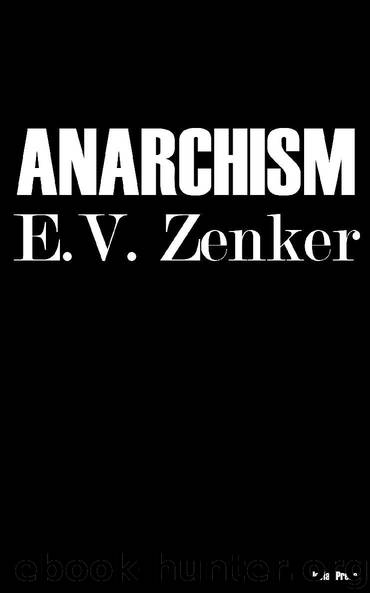Anarchism by E.V. Zenker

Author:E.V. Zenker
Language: eng
Format: epub
Publisher: Jovian Press
* * *
We cannot leave Bakunin without a passing mention of his favourite pupil Sergei Netschajew, although he was still less of a pure Anarchist than Bakunin, and can still less easily be separated from Russian Nihilism.
But a picture of this pair of twin brothers will show us better than long essays how much of the total phenomenon of modern Anarchism is a product of Western hyper-philosophy, and how much is an inheritance of Russian Nihilism. Sergei Netschajew, the apostle and saint of Nihilist poesy, was born at St. Petersburg in 1846, the son of a court official, and in time became teacher at a parish school in his native town. In 1865 he went to Moscow, where he became associated with the students of the Academy of Agriculture, and founded a secret society that called itself “The People’s Tribunal,” and formed ostensibly the “Russian Branch of the International Workers’ Union.” Both in St. Petersburg and elsewhere he appeared as the founder of such branch societies, attached to the Bakuninist section of the “International,” and chiefly recruited from the ranks of youthful students. In a pamphlet issued later (1869), in conjunction with his master, Bakunin, called Words Addressed to Students, he exhorted the students not to trouble about this “empty knowledge” in whose name it was meant to bind their hands, but to leave the University and go among the people. The Russian people, he said, were now in the same condition as in the time of Alexis, the father of Peter the Great, when Stenka Razin, a robber chieftain, placed himself at the head of a terrible insurrection. The young people who now leave their place in society and lead the life of the people would form an invincible, collective Stenka Razin, who would put themselves at the head of the fight for emancipation, and carry it through successfully. For this purpose they should not merely turn to the peasants and make them revolt, but also call in the help of robbers. “Robbery,” he said, “was one of the most honourable forms of Russian national life.” The robber is a hero, the protector and avenger of the people, the irreconcilable enemy of the State, and of all civic and social order founded by the State, who fights to the death against all this civilisation of officials, nobles, priests, and the crown. The Russian robber is the true and only revolutionary, the revolutionary sans phrase, without rhetoric derived from books, indefatigable, irreconcilable, and in action irresistible, a social revolutionary of the people, not a political revolutionary of the classes.
This was the programme of the society called “The People’s Tribunal,” as it was that of Nihilism generally, and, transferred from this into Western conditions, became the active programme of the “propaganda of action.” At the same time as the Words, there were circulating in the circles influenced by Netschajew other writings, either written exclusively by himself or in conjunction with Bakunin, such as the Formula of the Revolutionary Question, the Principles
Download
This site does not store any files on its server. We only index and link to content provided by other sites. Please contact the content providers to delete copyright contents if any and email us, we'll remove relevant links or contents immediately.
International Integration of the Brazilian Economy by Elias C. Grivoyannis(111057)
The Radium Girls by Kate Moore(12028)
Turbulence by E. J. Noyes(8047)
Nudge - Improving Decisions about Health, Wealth, and Happiness by Thaler Sunstein(7706)
The Black Swan by Nassim Nicholas Taleb(7129)
Rich Dad Poor Dad by Robert T. Kiyosaki(6632)
Pioneering Portfolio Management by David F. Swensen(6300)
Man-made Catastrophes and Risk Information Concealment by Dmitry Chernov & Didier Sornette(6019)
Zero to One by Peter Thiel(5801)
Secrecy World by Jake Bernstein(4753)
Millionaire: The Philanderer, Gambler, and Duelist Who Invented Modern Finance by Janet Gleeson(4478)
The Age of Surveillance Capitalism by Shoshana Zuboff(4292)
Skin in the Game by Nassim Nicholas Taleb(4248)
The Money Culture by Michael Lewis(4207)
Bullshit Jobs by David Graeber(4190)
Skin in the Game: Hidden Asymmetries in Daily Life by Nassim Nicholas Taleb(4006)
The Dhandho Investor by Mohnish Pabrai(3764)
The Wisdom of Finance by Mihir Desai(3746)
Blockchain Basics by Daniel Drescher(3582)
